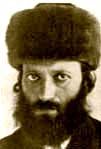(And let me just say, for the record, that if you only know Norman as a critic, you're not only missing out on some wonderful poetry--you're missing out on half his thought on any given topic. Or, at least, that's how it strikes me today.)
***
A lovely email yesterday from Mike, about my last post from "inside the eruv." I hope it's OK to post it here:
Dear Eric,For what it's worth, I'm not entirely sure that those who say "the secular is sacred" do in fact always mean that "the sacred is secular." Such reversable propositions mark Buddhist thought, certainly, and Yeatsian thought, and James Merrillian, too--but would Rav Kook, say, have agreed?
First many thanks again for posting my words and for the generosity with which you've introduced them. And yes, credit where credit is due, it was your bringing up Ari Elon's book that led me on my path. But, despite your fatigue, please indulge a bit of a response to your final cri de coeur. I'd hope that the thrust of my paper would reinforce the ribboni sense, and, in that wild pitch toward Whitman, Scholem's expression that the secular is sacred (and that therefore the sacred is secular), and that the only thing the poet seeks to do--in my estimation, where he/she most acts like a poet--is in testing and exploring the boundaries drawn by Authority against human freedom or self-realization. Not that the poet gets it right, but as a poet, he forswears the total comforts of the eruv, in order to live into his doubt, to be, as Elon insists for himself, self-authorizing (the message, as I see it, of Jewish ethics and teaching). That's the source and strength of my "inbetween-ness" (of the uncertainty that permeates my essay collection)--it was Yeats's when he said the poet must be at the threshold and not in the building, it is the Buddhists' who, in proclaiming that the world should be considered as the shrine room floor, speak of the very identity of nirvana and samsara, the sacred and the profane.
So yes rest in the eruv, but have a few wild dogs ready to unleash.
Many regards & best,
Mike

(Maybe so, but only inasmuch as what we think of as sacred is secular by comparison to the Utterly Sacred nature of the Ein Sof. That's slightly different, no?)
On the other hand--not to say on the Other Side!--I find the shouts out to Yeats and Buddhism, but especially to Yeats, quite useful. More on this anon.
***
Check this out, by Celia Dropkin (trans. by Kathryn Hellerstein).
 I stumbled on it in the Norton Anthology of Jewish American Literature. I should spend more time with that book.
I stumbled on it in the Norton Anthology of Jewish American Literature. I should spend more time with that book.My Mother
Twenty-two years old,
A widow with two small children,
My mother modestly decided
Not to be anyone's wife again.
Her days and years continued quietly,
As if lit by a meager wax candle.
My mother became wife to no one,
But all the daily,
Yearly, nightly sighs
Of her young and affectionate being,
Of her longing blood
Seeped into me.
I knew them with my child's heart.
And like an underground spring,
My mother's seething, concealed longing
Flowed freely into me.
Now out of me, into the open
Spurts my mother's seething, holy,
Deeply hidden lust.
ca. 1920-1930; pub'd in In heysn vint (In the Hot Wind), 1935
More translations by Hellerstein, a true heroine of Jewish poetry, folks, in this issue of The Drunken Boat. Read and be proud.
1 comment:
Eric, it's my first day of classes and I'm up to my tuchas in the usual, but feel free to reproduce the poem, keeping in mind that it's a midrash on the I. B. Singer story. More soon.
Norman
Post a Comment